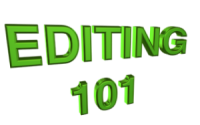 Character Profiles
Character Profiles
Whether you’re a plotter or a pantser (101:21), I’m almost 100% certain that at some point, you’ll have to keep track of your characters’ details. The plotter/pantser post also covered some practical ways that some authors make sure these details are fresh in their minds—or, at least, quickly available.
However, before you can list these precious tidbits of information, you have to either discover them (if your story leads you) or decide on them (if you lead your story). The obvious information is focused on physical appearance: eye color, hair color, stature, body shape, etc. But sometimes authors neglect to round out their profiles with other information that can play a critical part in your story. I’m talking about family history, background, social status, and psychological quirks. I touched on this briefly in the previous post, “Showing Character Emotion” (101:58). To quote:
“…Where did the character grow up? How well (or poorly) did they do in school? How did they treat their friends, if they had friends, or how were they treated by others? What have been their experiences in sexuality? Background information such as this—the little, hidden nooks and crannies in their lives—can be invaluable in deciding how an individual character will respond to a given situation.”
Imagine a character—a regular Joe, so to speak—waiting in line at the bank. Robbers suddenly burst in, shouting at everyone and waving guns. They push and shove the customers to the floor and demand their valuables.
Now, think about these possibilities:
-
How would a middle child, who had many friends, react to this situation versus a first child, who was friend-less?
-
What would a Harvard law-school dropout’s priorities be as opposed to an illiterate farmer?
-
How brave would a bullied, hen-pecked husband be versus an assertive, single businessman?
-
If there were two men of the exact same age, size, social standing, and intelligence—one a high-paid gigolo and the other a married father—how would they react differently?
One way to uncover this valuable information is to conduct interviews with your character. You might take the time to role-play with them—you’re a reporter interviewing them for a biography. How old were they when they learned to read? What kind of schools did they attend? What was their first job?
Another idea is to take your characters and put them in extreme, or funny, situations. If your macho ex-Vietnam veteran—used to wielding guns and jumping out of helicopters—had to take his five-year-old daughter to an amusement park, what kinds of things would he find frustrating, difficult, or exasperating? Or if your analytical white-coated scientist—more at home in a laboratory filled with antibacterial lotion than a dog park—was required to walk six dogs at once, what would she find frustrating, difficult, or exasperating? How would each solve their problems? (No, the stereotypical veteran cannot blow up the amusement park to get out of it, and no, the stereotypical scientist cannot inject the dogs with strong sedatives.)
I hope this gives you some ideas on sketching out characters who are strong, flexible, and unique!
Next week we’ll discuss ‘Deleted Material’
 Susan
Susan

This is fascinating – I don’t write complex character stories like this but I may in the future.
LikeLiked by 2 people
I’m glad it might be useful to you, Robbie! 😀
LikeLiked by 1 person
Reblogged this on Steve Boseley and commented:
Advice on the power of profiling your characters. I’ve tried this only recently for the first time. If you are thorough enough, you can just let these characters loose in your world and watch them make decisions for you!
LikeLiked by 2 people
Thanks for reblogging, Steve 😃
LikeLike
Thanks for sharing, Steve!
LikeLiked by 1 person
Wonderful post Susan. I enjoy reading your informative articles. 🙂
LikeLiked by 2 people
You’re welcome! Thanks for reading and commenting. 😀
LikeLiked by 2 people
Thank you! 🙂
LikeLiked by 2 people
Reblogged this on Becky's Book Notes and commented:
Great tips as always from Adirondack Editing. Thanks, Susan and Chris! This is where I’m hitting a snag in my plotting. Hopefully, this will get me over the hump! 🙂
LikeLiked by 2 people
Thanks for sharing, Becky 😀
LikeLike
Oh, good! I’m glad it’s useful for you right now! ❤
LikeLiked by 1 person
Discovering who my characters /are/ is a huge part of the joy of writing. Great post. 🙂
LikeLiked by 2 people
Yay! 😀 Thanks for leaving me a comment.
LikeLiked by 1 person
😀
LikeLiked by 2 people